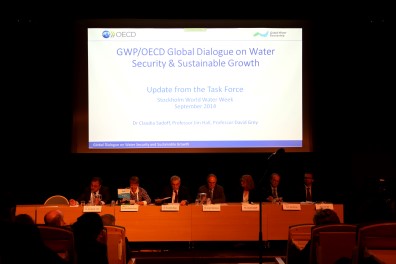The GWP/OECD Task Force were gathered at World Water Week in Stockholm on September 3rd, the same place where the Global Dialogue project was launched one year ago. The event was chaired by GWP Chair Dr. Ursula Schaefer-Preuss, who also made the opening remarks, explaining the project.
"The aim is to raise the profile of water on the global agenda at this critical moment, to bring country perspectives into the global debate, and to put forward new knowledge on the issue of water security and sustainable growth," said the Chair.
Since the launch, the task force has been gathering evidence through a multidisciplinary team of researchers all over the world to find out how water security and economic growth interconnect.
“We found out that there has been surprisingly little economic analysis done on water security,” said Dr. Claudia Sadoff (World Bank) when introducing the work of the group. Dr. Sadoff leads the research team together with professors David Grey and Jim Hall of Oxford University.
“Economics literature shows there is a high correlation between water infrastructure investments and economic growth, but causality runs in both directions and the effect of infrastructure on growth is difficult to isolate,” explained Jim Hall. “The economics are intuitive, but empirical evidence is thin.”
Preliminary Findings
The economic loss due to water-related disasters was $50 billion in 2013. To measure future water-related risks, the researchers looked at droughts, water scarcity, high variability, floods, inadequate water supply and sanitation, and harmful impacts on the environment. They also looked at water-related opportunities: food, energy, transport, and ecosystems – where the enhancement of these services could be made. The research is trying to identify pathways to water security.
The initial findings show a causal relationship between water security and economic growth. Results at basin level demonstrate that mean annual temperature, annual runoff, and drought, are the most significant climatic predictors of economic growth.
Based on the preliminary findings, the task force outlined some emerging recommendations, such as preparing for extreme floods and continuing to provide clean water and sanitation. Improved information, infrastructure, and institutions are also foundational to water security.
“The bottom line is, spend wisely – some investments are not beneficial,” said David Grey. “Not all investments are beneficial, appraisal is needed, and we must identify, categorize, and evaluate investments. Science without policy is science. Policy without science is gambling.”
Panel Feedback
Following the presentation of the GWP/OECD Task Force, a high level panel was given the opportunity to comment.
Mr. Alok Rawat, of the Indian Administrative Service, Ministry of Water Resources, said that based on his personal experience, he has come to understand that the demands on water require economic development: “The question is, what development are we aiming at?”
Mr. Herbert Oberhänsli, Vice President of Economics and International Relations at Nestlé, said that speaking from an industry point of view, water has been part of the discussions for a long time.
“Industry is aware of the importance of water security. In the sector I work in, the food industry, we depend on water. Without water, there is no food. We also need it for the processes of producing food.”
The Global Dialogue will ultimately result in a milestone report on ‘Water Security and Sustainable Growth’ to be presented at the World Water Forum in South Korea in 2015. Speaking on behalf of the arrangers of this event was Dr. Benedito Braga, President of the World Water Council. He noted that the Global Dialogue is a “rational way to look at water security”.
“I see it as a good opportunity in our work towards a water goal, because we need to think about what we are proposing to the UN system. We need to be able to measure results that go beyond water supply and sanitation – this dialogue can be good opportunity to present something meaningful,” said Dr. Braga.

